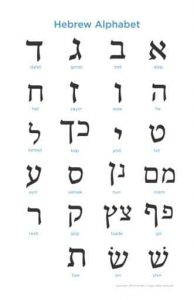 The Jewish people always considered the Hebrew Alphabet to play a central role in its culture. Traditionally, it was held to be holy and sanctified, with each of the 22 letters playing a vital irreplaceable part.
The Jewish people always considered the Hebrew Alphabet to play a central role in its culture. Traditionally, it was held to be holy and sanctified, with each of the 22 letters playing a vital irreplaceable part.Psalm 119, the longest chapter of the Bible, openly reflects the belief in the centrality of the traditional arrangement of the Hebrew Alphabet. We can follow this attention to exact wording and pronounciation of Hebrew letters into every step of Jewish history. The Talmud states that if a person mixes the letter ע with the letter א, or the letter ח with the letter כ, he cannot qualify as a kohen to say the priestly blessing, nor as a regular israelite to lead the public prayer. Ethiopian Jews are very lucky to have these same consonant letters existing in their language. Therefore it is sad to see many Ethiopian Jews choosing to mispronounce these letters when they speak Hebrew, choosing instead to follow the European poorer version, which makes no distinction between these consonants. There is also the Yemenite pronounciation of Hebrew, which is of itself of great antiquity, and also under pressure. In the middle eastern as well as in the North and East African linguistic context, there are further nuances concerning more consonants such as the letters ג, ק, צ, ס.
The variants for these also follow rules of Dagesh and Rafe, for either soft or hard nuances. All such tone differences allow for greater mastery of the rich poetics of the Hebrew language. Being classified by linguists as an afro-asiatic language, among which we find Amazigh (related to ancient Egyptian), Arabic, Aramaic, and Amharic among many other idioms, Hebrew naturally sounds like many of these languages, albeit with its own specificities which distinguish it from the rest.
It is important to maintain intelligibility between familiar languages, because it allows for greater understanding of the linguistic contextual tools available in speech.
“Romemanu mikol lashon” ‘…who elevated us among all languages, to sanctify us with His Commands..’ said during Kiddush of the Holidays, indicates Hebrew as a language uniquely allowing for the understanding of many other idioms.
When these other languages translate the concepts conveyed by Hebrew language, they become elevated, and have the power to transform for the better the lives of their speakers. This is why it is so important to preserve this antique heritage.
Each part of it, the sounds and shapes of this linguistic legacy, is precious and profound, has been carefully handed down over hundreds of generations, and should not be neglected.
